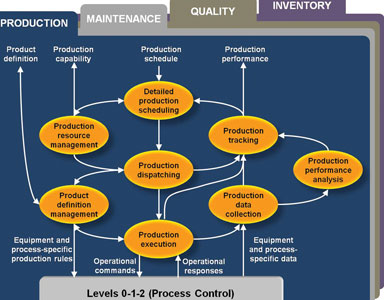

Wonderware Southern Africa has won the 2009 Frost & Sullivan Market Leadership Award for the South African manufacturing execution systems (MES) market. In a survey of 36 suppliers of MES solutions to the South African market, Frost & Sullivan found that 18 accounted for 74,5% of the market based on 2008 revenues. Of these 18, it determined that Wonderware Southern Africa had the largest share of the local market for MES solutions.
Market share: The percentage of the total market serviced by a firm or brand. Wikipedia.
Wonderware Southern Africa has won the 2009 Frost & Sullivan Market Leadership Award for the South African manufacturing execution systems (MES) market. In a survey of 36 suppliers of MES solutions to the South African market, Frost & Sullivan found that 18 accounted for 74,5% of the market based on 2008 revenues. Of these 18, it determined that Wonderware Southern Africa had the largest share of the local market for MES solutions.
“We are very honoured to receive such a prestigious award,” says Deon van Aardt, MD of Wonderware Southern Africa. “In the past, it seems that companies have considered MES as just another vendor-driven acronym but things have changed and continue to change at an accelerated rate. Automation engineers and business IT alike are realising that MES is the vital information link between business and production that gives them the control they are looking for. This realisation is coming about after years of market education and proof of successful implementations in numerous industries and with companies of all sizes.”
Frost & Sullivan says that Wonderware Southern Africa and Invensys Operations Management have been successful for three critical reasons: They address a shortage of skilled engineers and technicians needed to install, control and maintain MES solutions; they educate end users about the benefits of employing MES technologies; and they continually introduce new software packages that enable Wonderware System Platform and InTouch HMI solutions to be integrated with solutions from a wide range of vendors using a single, unified platform.
“MES can impact most of the critical wealth-creating areas of manufacturing companies and it is vitally important that we, as solutions providers, fully understand all the issues,” explains van Aardt.
“Depending on the industry, the MES footprint in a company can be large or small but it is always there. In fact, no company can exist successfully without integrating their business and production processes – they may not be using a system but MES functionality has to exist for them to trade profitably and competitively,” he continues. “So, one of our challenges is to show prospective customers that what we have to offer is not a new concept but a much better way of providing actionable knowledge, and therefore control, at all levels of an organisation.”
When Wonderware Southern Africa won Frost & Sullivan’s 2009 South African Manufacturing Execution Systems (MES) Market Leadership award, product excellence was not the only reason.
Background
MES was coined around 1990 in order to bridge the gap between production and business processes and to provide the decision support necessary to effectively manage production, maintenance, quality and inventory. Although it has been available for 20 years, a large proportion of manufacturers who have implemented an MES have done so within the last two. This came about largely through market education and the rapid evolution of solutions that overcame the limitations of the early ones.
Early MES solutions were monolithic in nature and ‘scared off’ many would-be users because of their cost, the unknown effects they would have on virtually every aspect of the company, the time they would take to implement, their inflexibility, their proprietary nature and their inability to work easily with existing initiatives on the shop floor (scada) and the top floor (ERP). A clipboard has none of these limitations although it has obvious and numerous shortcomings of its own.
So, if one wanted to make inroads into this market, it would be important to address customer needs in a logical manner with cost-effective solutions that made sense in the short, medium and long term and that would not only look after existing assets but help customers capitalise on them.
Wonderware MES evolution
Wonderware’s MES came into existence as a natural evolution of the company’s 20-year history as a leading HMI, scada and Historian vendor. This occurred in parallel with customers’ evolving needs to better understand and control their production and related processes, which ensured that its MES solution would be solidly grounded with the realities of scada. At the same time, Wonderware had done extensive work with SAP to develop its Enterprise Integration software that would link MES solutions to the company’s ERP system for the bidirectional exchange of data. The stage was set.
In 2007, Invensys acquired CIMNET, an MES software company, and its Factelligence suite of products which was subsequently integrated with Invensys’ open industry standard-based ArchestrA technology to ensure rapid deployment and ease of use by the Invensys and Wonderware global installation base of over 100 000 plants.
The integration of Factelligence and ArchestrA technologies were crucial to overcoming two of the major hurdles of MES implementation – maintaining existing investments and the limitations of closed, proprietary software. ArchestrA is the equivalent of an ‘operating system’ for industrial automation and provides a common platform for all Wonderware applications. Now, Factelligence, one of the world’s leading MES solutions, was integrated with one of the world’s leading industrial automation and realtime production information delivery suite of solutions.
Wonderware’s MES could also be implemented incrementally as and when the customer required, which meant that costs and risks were contained and that new modules were only implemented after the previous module had proved its worth.

What Frost & Sullivan found
The 2009 Frost & Sullivan report lists the key factors that have contributed to Wonderware’s success in this market:
Addressing end-user awareness of MES benefits
Most end users are not aware of the potential benefits of utilising MES technologies within a given plant or field. To aid in the education of end-user companies about the benefits of employing MES technologies, Wonderware has invested a lot of resources to provide existing and potential clients with MES product information that highlights the benefits of employing such technologies, including the expected ROI to be gained from the project. To add to client enlightenment, Wonderware also conducts end-user focused workshops eg, the annual System Integrator Conference and the X-CHANGE User Conference.
New software
To enhance its position within the South African MES market, Wonderware has introduced new software packages that are based on the ArchestrA realtime service-oriented architecture technology. The new software enables integration with Wonderware’s System Platform and InTouch HMI software. An advantage includes the integration of an MES, enterprise manufacturing intelligence, human-machine interface and supervisory control and data acquisition solution using a single, unified software platform. ArchestrA technology also benefits the end user because it enables the hosting of applications from a wide range of process control solution vendors. This approach empowers end-users to achieve their business goals without abandoning prior investments in automation, process control or information systems.
Conclusion
Probably, part of the success of Wonderware MES is that Wonderware recognises that MES is part of the information and control continuum that mining and manufacturing companies need to win. So MES has to work in an integrated way not only with scada and ERP but also with other information initiatives such as Enterprise Manufacturing Intelligence and Business Intelligence – all pieces of the same puzzle.
For more information contact Deon van Aardt, Wonderware Southern Africa, 0861 WONDER, [email protected], www.wonderware.co.za
© Technews Publishing (Pty) Ltd | All Rights Reserved